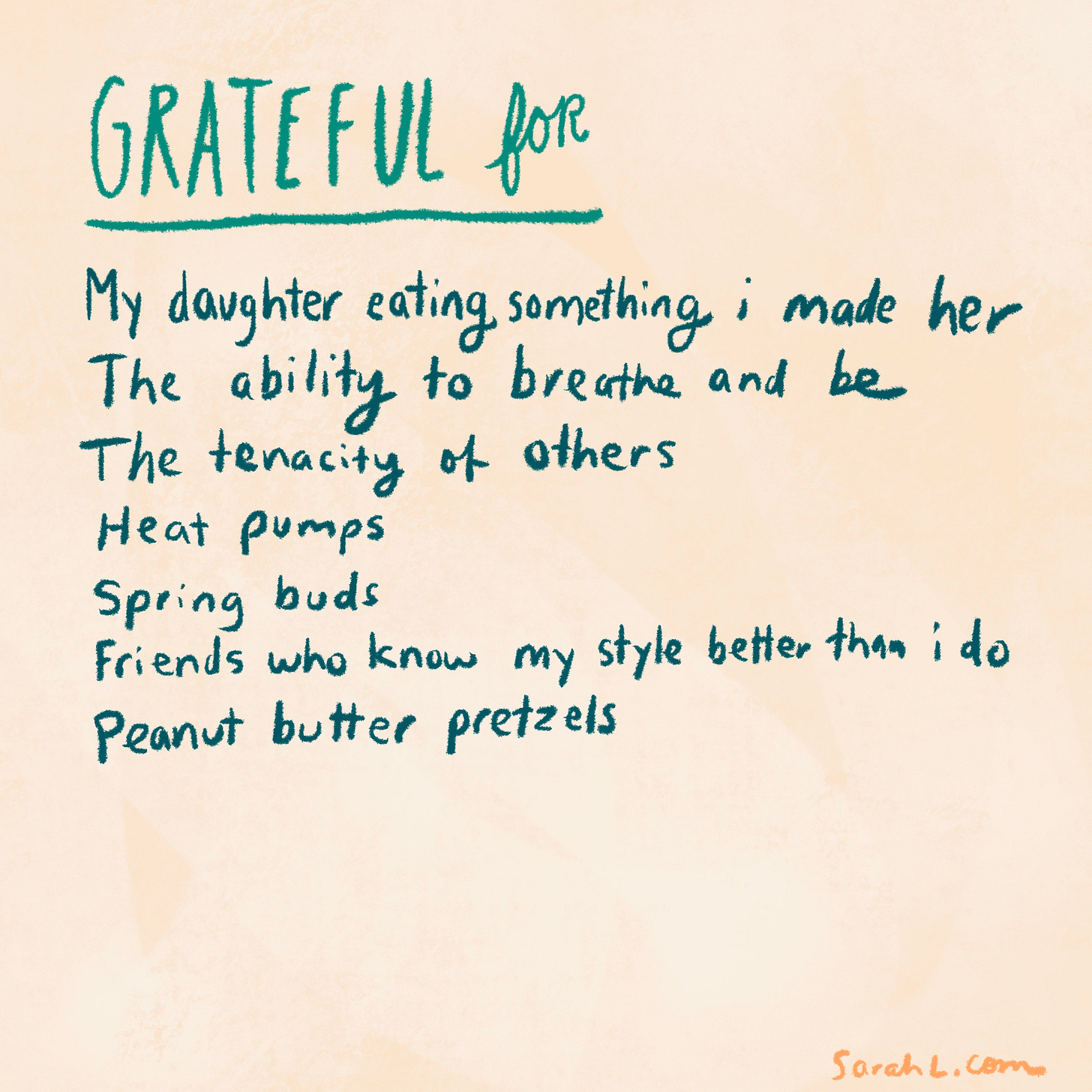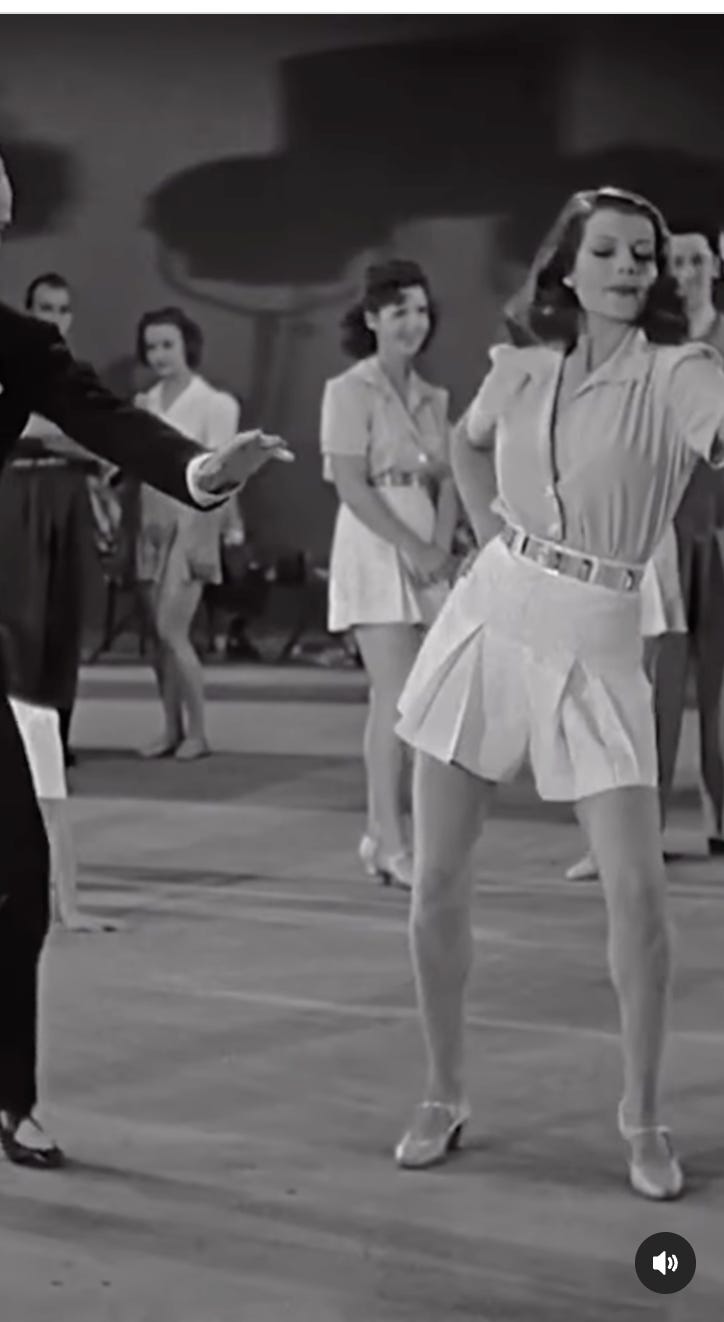Let go, let's go!
# It’s a crosshatch not a hashtag, and I will die on this tic tac toe hill
If you read just one climate newsletter, make it Chris Hatch’s Zero Carbon in the National Observer. He is so consistently good and informative you will not regret it. Plus, his name is Chris Hatch. Which makes me want to crosshatch (###) because I am both a weirdo and a girl who spent too much time in art class. Last week Chris reframed the conversation around climate despair, breathing new life into old ideas, comingling love for nature with gratitude and meditation in a post that is much more than the sum of its parts, and blissfully spa music-free despite its breathe-easy bonafides. I have read it thrice.
Hatch writes, “I thought I’d share an insight from the Tibetan Buddhist teacher Mingyur Rinpoche — the antidote to climate despair, he says, isn’t necessarily finding hope but generating gratitude.”
This seems both counterintuitive and twee, and yet it’s neither. You want me to write down what I’m grateful for in this little teal journal I bought when I was full of good intentions and an expensive stationery obsession? Precisely.
Chris again:
The real mental trickery, he (Mingyur Rinpoche) said, arises from our mind’s tendency to fixate. Show the mind nine wonderful things and it will fixate on the 10th if that one’s negative. “All or none thinking becomes stronger and stronger in extreme crises.”
And so, it requires a deliberate effort to achieve any clarity and move forward making good decisions uncoloured by confusion and distress. The antidote he prescribes is the conscious cultivation of appreciation and gratitude. The traditional Tibetan practice apparently consists of collecting small white stones and moving one for every positive thought or feeling that arises — a way of making the ephemeral tangible.
We practice gratitude to make the ephemeral tangible, whether by saying words out loud or committing them to paper or modern dance. In so doing, there’s a transference from brain to reality, from fog to clarity, from abstract to appreciable. I’ve written before about writing down the wins. It’s like that, but more legit, because, you know, he is a Tibetan monk.
I ask my son what he is grateful for every night (Yes, I’m increasingly sappy in my dotage), and while he has recently taken to gamifying the query (“Mother nature, because that covers everything. Done.”), I know that the act of considering the prompt gives him an opportunity to concretize the things about the world that he loves most. Like Nerf battles, the Mandalorian, and maybe (she wishes), his family.
“Slowly, slowly you will make new connections in your body,” says Mingyur Rinpoche. “You will make neuronal connections and your brain will change.”
How does a brain change? Easily. (Especially when you’re nine, and the grooves aren’t as fixed.) This is not to say that the IPCC reports don’t gall and frighten me in equal measure, but I do notice a new facility in how I process and compartmentalize these data drops. The latest report came out last week. Unlike previous drops, I did not grieve, or cry, or wallow (though it would have been more than fine to do so). It’s not because the news isn’t bad, but because it doesn’t change me (a privilege, to be sure). A preponderance of dire doesn’t increase my will or desire to act or induce further urgency, because I am already full throttle, and OK with that. I want the reports to be reported and I want people to awaken to the urgency of the moment. And I want to work and breathe so that others may do likewise.
At the same time, I want to record being aware and awake and grateful to be alive at this moment. Like Eric Holthaus says and I repeat ad nauseum, “you are alive at just the right moment to change everything.”
Back to Chris and Rinpoche:
“Let go, but don’t give up.”
Solid advice, whether we’re connecting inwards to transform ourselves or connecting outwards to transform the world.
I love the let go and understand what is meant by don’t give up, but I think there’s a further evolution, to spin not giving up into taking action together.
The last part comes from Naomi Klein, who pulls the idea of finding your way (and your community) together beautifully in a recent interview in The Guardian:
I think the most important thing is to just find other people. Trying to think through this by yourself is a recipe for feeling like a failure and getting dispirited very, very quickly. The benefit of being part of a broader movement is knowing that some people are doing some things, and other people are doing other things, and nobody has to do everything.
I always tell students to find a movement you feel comfortable in, make sure it’s interlinked with other movements, and then work in coalition as broadly as you possibly can.
And then marry your passion with need. Whatever you want to do, find a way to connect it with the climate crisis. Maybe it’s art, maybe it’s engineering, maybe it’s planning – it’s all needed. I don’t think people need to give up what they’re passionate about to tackle climate change. I think they need to figure out how to connect what they’re passionate about with the climate crisis. Because this is the work of our lifetimes.
Precisely.
I love the oft-uttered let’s go of my colleagues and friends, and it performs double duty in so much as it tells you both not to give up and to go for it with other people. So Let’s! I humbly propose let go, let’s go.
This planet
How do you bring it all together? LMK!
Last planet
Thank you for raging against the rabé wrappers with me. I got so many lovely responses. One from a high school friend I had not spoken to in 25 years, give or take a week. Hi Maayan! It is so nice to be connected to people here, and to know we’re all working our way towards solutions, in our respective geographies.
Stuff
Rebecca Solnit is so good it hurts to read her sometimes. I feel like this bit ties to what Rinpoche was saying above:
Much of the reluctance to do what climate change requires comes from the assumption that it means trading abundance for austerity, and trading all our stuff and conveniences for less stuff, less convenience. But what if it meant giving up things we’re well rid of, from deadly emissions to nagging feelings of doom and complicity in destruction? What if the austerity is how we live now — and the abundance could be what is to come?...
This is the kind of abundance we need to meet the climate crisis, to make many, or even most, lives better. It is the opposite of moral injury; it is moral beauty. A thing we needn’t acquire, because we already have it in us.I love Sarah Wilson. And I love this I Quit Gas campaign.
My new colleague Stacey Abrams (!) brings the fire in Heated:
Fundamentally, as someone who is an advocate for democracy, I want everyone to be able to vote. Wanting someone to choose what you choose is good. But the most important piece, and what should be driving everyone, is the freedom to make the best choices possible. The freedom to improve your life, the freedom to have more money in your wallet. And the fear-mongering that is trying to intervene in and stop those choices should be concerning to everyone, because those are the very same people who love to use the word “freedom,” but don't seem to want to offer it to consumers in this moment.
Make sustainability the default. Hollywood Reporter. Featuring quotes from my fave Leah Stokes.
The real reason you’ll eventually ditch your gas stove, in the excellent new pub, Heatmap, by the excellent Emily Pontecorvo.
If you read just one newsletter about the Toronto music scene, make it Michael Barclay’s Airplane on the Highway. Writing about the delight that is Whitehorse today!
Disney defeats DeSantis. Warms a Floridian heart.
People dancing
It’s almost April. The sun makes me so gleeful I’m ready to triple timestep my way down the street, much to my son’s embarrassment. Fred and Rita are perfection!
Bonus people singing
It’s been a while since I posted a Bella Ciao. Here’s a repost of a version from last year that I love so much.
HEAT PUMP PARTY
It’s like a Tupperware party, but for pumps. If you’re in Toronto and want to come, message me for heats and deets! I see the work of electric evangelizing as two-pronged(!). There’s the person who tells you all about it at a mile-wide-inch-deep level (me), and the person who goes granular, connecting you to the tools, resources, and contractors who will help you electrify. That other prong is my friend Rich, who consults would-be-electrifiers across the province, and has helped a good ten of my friends pump it up. On Saturday, April 15th, we’re hosting a heat pump pop-up at my place, a cinq à sept it and forget it, a heat pumperware party. I’ll stop now. But it’s a chance to learn about heat pumps from both prongs, and check out heat pumps of all kinds (we’ll hop down the street to check out another neighbour’s pump, too) and have drinks and snacks.
If you’re in the neighbourhood and looking for a heat pump, join us.
Thanks so much for reading. Always let me know how to make this newsletter better. Have a beautiful weekend. Hope you can let go and let’s go!
Sarah







I'd like to come to your heat and greet but the link for messages isn't working!
Have you read False Alarm by Bjorn Lomborg? I am currently reading it after watching an interview that Lex Fridman did with him and Andrew Revkin. If so, I would curious to hear your opinion on it as you seemed to be knowledgeable on the topic. :)